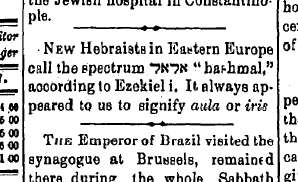Most people know that חשמל (chashmal), the modern Israeli Hebrew word for electricity, was coined by Yehuda Leib Gordon. His inspiration was Ezekiel 1 and 8 which used this word to explain what the appearance of some kind of brightness was like. What does the word actually mean? The Talmud gives two interpretations (Chagiga 13a-b) חיות אש ממללות and עתים חשות עתים ממללות בשעה שהדיבור יוצא מפי הקב"ה. Both of these are wordplay describing angels of some sort, and their activity. Neither of these are particularly useful as definitions in the sense that unless you've seen חיות אש ממללות then telling us that a brightness looks like them isn't so helpful.

As it turns out, the other etymologies that have been suggested are very similar in terms of how it is believed the word was constructed. The Septuagint translated it ἠλέκτρου (elektron) which was Gordon's inspiration. The Greek word ἠλέκτρου, or elektron, meant "amber," not angels. The Latin Vulgate used the word electrum, which is a kind of metal alloy. This doesn't tell us why these translators understood the word to mean these, but one scholar proposed that חשמל is a compound term constructed from נחש, meaning copper, and מללא, an Aramaic term for gold. On מללא as gold, see Kes. 67a, where Rashi explains it as gold leaf, and Tosafos as gold ore - I was curious how Artscroll would translate it, and they say "gold dust" on the authority of Rashi, but I think they totally misunderstood him. Even though I think the simple sense of his words are "gold leaf," I would be less confident in myself if not for the fact that Rashi translates it into French and he very clearly says "leaf" - פלאל"א. Even an English speaker should be able to figure it out just by how it sounds. But as it turns out, the modern equivalent "feuilles" means "leaf." Dust, or "poussière" is simply not close enough. Soncino gets it right.
In any case, Gordon used chashmal in a brilliantly titled poem, which he completed in 1883, called שְׁנֵי יוֹסֵף בֶן שִׁמְעוֹן, an epic about communal corruption and identity theft. To make a long story short, a really diligent, good Talmudic child prodigy goes to Padua to learn Torah and medicine. In the meantime, a horse thief named Uri pays off a communal official to write a passport for him under the name of the missing student. When the student returns to Russia, he is arrested for a murder committed by Uri, who's been using his name, and sentenced to exile for life in Siberia. In the 5th Canto, Gordon describes the youth's studies in Padua, and correlates all sorts of sciences with traditional terms and concepts. For example, tuma ve-tahara is related to hygiene. The ma'aseh bereshis and ma'aseh merkava are correlated with natural science, and in the course of it he refers to kabbalistic terms which are forces of nature, one of which is chashmalah. Although this would no doubt have escaped the reader, he clarified in a note that he meant electricity - "כוונתי להכוח הטבעי הנקרא עלעקטריציטעט, שכן תרגום היווני של חשמל הוא עלעקטרא," "My intended meaning is the natural energy called electricitat, as in the Septuagint translation of chashmal as elektra." Others, no doubt, have charted the spread of this term thereafter. Gordon himself thought that the term could even be extended in yet another compound wordplay, since חשמל could also be thought of as a compound formed from חש מל, the first meaning "quick" (as in Isaiah 8:1) and the latter stemming from מלה, or word. In other words, quickword, or telephone (or perhaps telegraph). Obviously חשמל was only accepted for electricity.
Since the word appeared after 1883, was the word used in any other sense in modern Hebrew writings before or around the same time? I don't know, but maybe. Here is a short blurb in the November 11, 1887 issue of the American Israelite:

I have a problem here. The Hebrew says אלאל but the transliteration is "hashmal." I don't know where the mistake is, but assuming it's just a Hebrew typography mistake, then the writer of this blurb (probably Isaac Mayer Wise) is saying that some modern Hebrew writers are using chashmal in the sense of spectrum, which makes sense in a roundabout way. The Latin word for the copper-gold alloy mentioned earlier is aurichalcum, a word which is related to aurum, or gold. Perhaps these unnamed Hebraists thought that aurum was related to iris, or rainbow in Latin.
A final note: it's interesting that the word for electricity in modern Arabic was also purloined from the word which formerly meant "amber," and for the exact same reason, albeit a little earlier (and clearly unknown to Gordon). Rifa'a el-Tahtawi (1801-1873) is generally given the credit for expanding a preexisting term for amber to include electricity, because of the Greek ἠλέκτρου which, after all, is where the European forms of the the world electricity came from.
Ultimately there was little rhyme or reason for calling it electricity in the first place, other than the European penchant at the time for writing learned works in Latin. See here for the etymology of "electricity." Since it was an English scientist who in fact coined the term, because of the attractive powers or amber, I suppose he could also have called it ambericus instead of electricus. Francis Bacon is credited with introducing it into English a little later, as electric - he could have used amberic.
A final final note: not surprisingly the fact that the modern Hebrew term comes from the loftiest, most esoteric part of the Jewish tradition, and the fact that Yehuda Leib Gordon was a radical maskil inspired rejection of his term on the part of many traditionalists who do not call electricity chashmal in Hebrew to this day. They call it . . . electricity.
